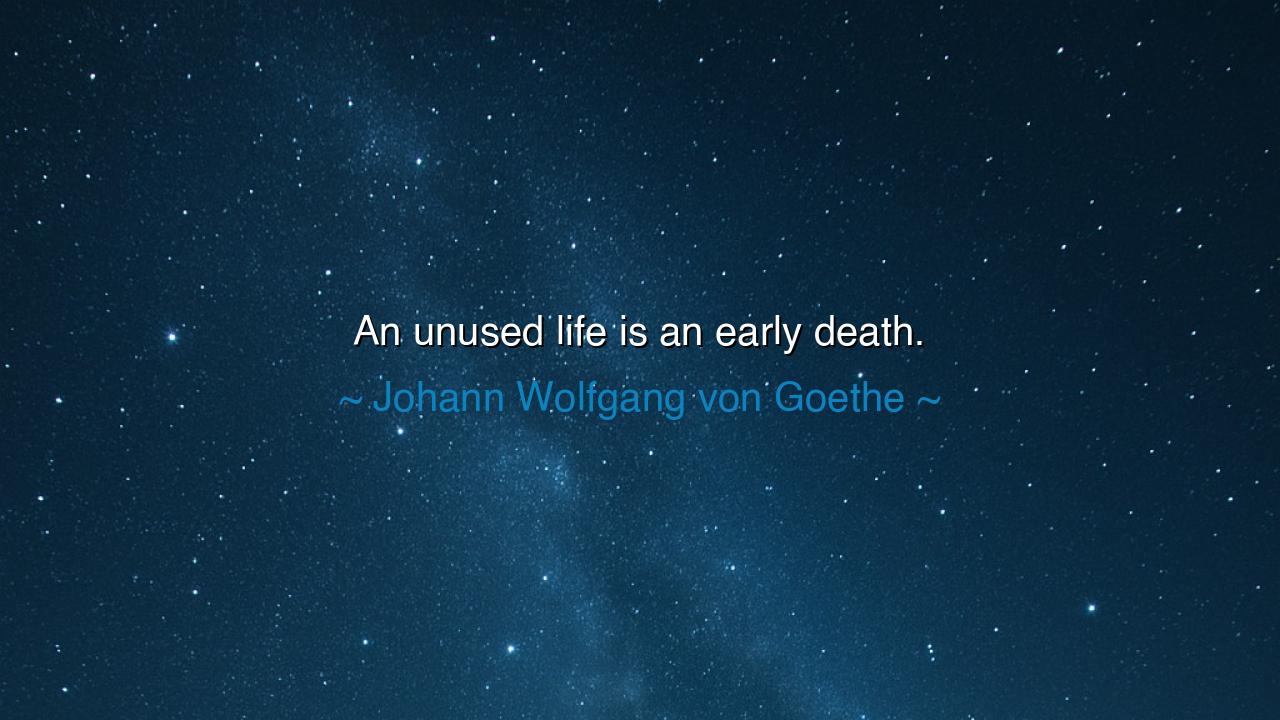
An unused life is an early death.






In the solemn and immortal words of Johann Wolfgang von Goethe, poet, philosopher, and seer of the human spirit, there resounds a truth as eternal as the sun itself: “An unused life is an early death.” This is no mere poetic flourish—it is a warning, a summons, and a revelation. Goethe, who lived at the dawn of modern thought, saw that the greatest tragedy of man is not that he must die, but that he may live without ever truly living. To be born with breath yet deny one’s purpose, to let the fire within go cold, is to perish long before the grave. Life unused is life unlived, and to waste one’s potential is to walk among the living as one already buried in spirit.
Johann Wolfgang von Goethe, born in 1749 in Frankfurt, was a man of vast genius—poet, playwright, scientist, and philosopher of the soul. His works, such as Faust and The Sorrows of Young Werther, explored the ceaseless hunger of the human heart for meaning and fulfillment. Goethe knew that life itself is an act of creation, and that existence without striving, passion, or growth is no better than stillness in the tomb. His quote emerges from this vision: the understanding that a man who does not use his mind, his talents, his love, or his courage is already half-dead, even if his body still moves through the motions of routine.
To live fully, Goethe believed, is to awaken the divine spark within—to act, to dream, to suffer, and to strive. An unused life is one where that divine energy remains dormant, where fear or complacency smothers the soul’s natural fire. The ancients understood this too. The Greeks called it arete, the pursuit of one’s fullest excellence; the Romans called it virtus, the courage to fulfill one’s duty and destiny. To fail to rise to one’s calling, to spend one’s days in idle comfort or cowardly retreat, was to betray not only oneself, but the very breath of life that the gods had given. Goethe’s words carry the same spirit: the soul that does not labor toward its own becoming decays before its time.
History is filled with those who refused the death of the unused life. Consider Leonardo da Vinci, who never let the boundaries of art contain his vision, but stretched into science, anatomy, engineering, and philosophy. His mind, restless and luminous, could not remain still. Or think of Helen Keller, born into silence and darkness, yet who transformed her world through relentless determination. She once said, “Life is either a daring adventure or nothing.” These are the souls Goethe speaks to—the ones who knew that the true enemy is not mortality, but stagnation. The world remembers such people not because they escaped death, but because they lived before dying.
And what of those who did not? How many walk through life asleep, their days spent in repetition without reflection, their dreams abandoned to the comfort of mediocrity? These, Goethe warns, are the early dead. Their bodies may endure, but their spirit withers for lack of purpose. To them, time passes not as opportunity, but as erosion. Such a life, unused, is a slow vanishing—a flame extinguished not by fate, but by neglect. For to live without using one’s gifts, without seeking truth, without giving love, is to bury one’s soul in the dust of existence.
Yet Goethe’s words are not a condemnation—they are a call to awakening. They urge each of us to seize our days as sacred, to treat every sunrise as an invitation to creation. An unused life can be transformed at any moment, if one only dares to begin: to learn, to give, to act with intention. Even the smallest act of meaning—a word of kindness, a work of art, a spark of courage—breathes life back into the heart that had grown still. The early death of the spirit can be reversed by the choice to live deliberately, to refuse apathy, to embrace the miracle of one’s own existence.
So, children of the future, let this wisdom be written upon your hearts: use your life. Do not hoard your talents like coins buried in the ground, nor wait for perfect conditions that never come. Pour your energy into the world—into work that uplifts, into love that heals, into dreams that demand your full measure. For life, once spent in service of purpose, grows richer even as it ends. And when the hour of death truly arrives, you will meet it not as one who dies too soon, but as one who has lived so deeply that death itself can take nothing more. For as Goethe teaches us, the only life worth mourning is the one that was never used—and the only immortality worth seeking is to live now, fiercely, fully, and without fear.






AAdministratorAdministrator
Welcome, honored guests. Please leave a comment, we will respond soon